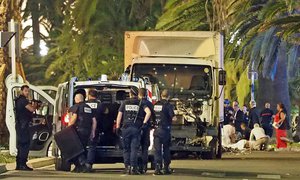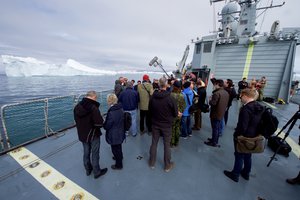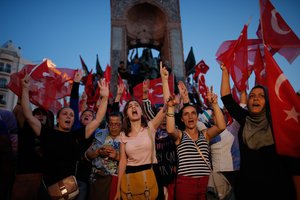- published: 21 May 2014
- views: 5298
-
remove the playlistCode Of Conduct
-
remove the playlistLatest Videos
-
remove the playlistLongest Videos
- remove the playlistCode Of Conduct
- remove the playlistLatest Videos
- remove the playlistLongest Videos
- published: 24 Aug 2015
- views: 6225
- published: 02 Oct 2010
- views: 63749
- published: 25 Sep 2012
- views: 6245
- published: 13 Jul 2015
- views: 15742
- published: 25 Apr 2012
- views: 8196
- published: 17 Jul 2013
- views: 5438
Code of conduct
A code of conduct is a set of rules outlining the social norms and rules and responsibilities of, or proper practices for, an individual, party or organization. Related concepts include ethical, honor, moral codes and religious laws.
In its 2007 International Good Practice Guidance, "Defining and Developing an Effective Code of Conduct for Organizations", the International Federation of Accountants provided the following working definition:
A common code of conduct is written for employees of a company, which protects the business and informs the employees of the company's expectations. It is ideal for even the smallest of companies to form a document containing important information on expectations for employees. The document does not need to be complex or have elaborate policies, but the file needs a simple basis of what the company expects from each employee.
Codes of conduct are also increasingly being adopted for conferences and other professional gatherings.
Effective codes of conduct include details of how to report violations.
This article is licensed under the Creative Commons Attribution-ShareAlike 3.0 Unported License, which means that you can copy and modify it as long as the entire work (including additions) remains under this license.
- Loading...

-
 45:18
45:18Gangland S 1 Ep 3 Code of Conduct HD
Gangland S 1 Ep 3 Code of Conduct HD -
 3:31
3:31Code of Conduct: Ethics and Quality
Code of Conduct: Ethics and QualityCode of Conduct: Ethics and Quality
-
 3:27
3:27This is our Code of Conduct
This is our Code of ConductThis is our Code of Conduct
The little choices we make every day build a bigger picture – doing the right thing for our customers, colleagues and communities. This is our Code of Conduct. This is what we stand for. http://codeofconduct.akzonobel.com/ -
 8:32
8:32Modern Warfare 2 Soundtrack - Code Of Conduct
Modern Warfare 2 Soundtrack - Code Of ConductModern Warfare 2 Soundtrack - Code Of Conduct
The Call of Duty: Modern Warfare 2 Original Ingame Music, Composed by Hans Zimmer & Lorne Balfe. -
 3:20
3:20CODE OF CONDUCT.wmv
CODE OF CONDUCT.wmv -
 7:01
7:01US Military Code of Conduct 2014
US Military Code of Conduct 2014US Military Code of Conduct 2014
God Bless America and her WARRIORS! -
 28:53
28:53Code of Conduct
Code of ConductCode of Conduct
Here's a short film we made for the school our first semester of our Senior year (2011). Don't you worry, anything educational is completely overshadowed by our stupidity. Join the Raw Lemon cast as we take you into the zaniness of a day in Molina High School (or at least in our eyes), and what it takes to be sent to the school's prison. -
 14:05
14:05Tariq Nasheed Q & A From The Atlanta Code Of Conduct Tour
Tariq Nasheed Q & A From The Atlanta Code Of Conduct TourTariq Nasheed Q & A From The Atlanta Code Of Conduct Tour
http://tariqradio.com http://hiddencolorsfilm.com http://tariqelite.com -
 1:22
1:22Funny Code of Conduct Training Video
Funny Code of Conduct Training VideoFunny Code of Conduct Training Video
Dawido, the new software engineer from Latvia can't understand why he isn't allowed to drink and smoke Turkish cigars in his cubical. FREE iPhone Compliance App http://www.cogentys.com/course-library/compliance-training/ -
 2:14
2:14The ABB Supplier Code of Conduct
The ABB Supplier Code of ConductThe ABB Supplier Code of Conduct
At ABB, we work hard to conduct business ethically and with respect towards employees, society, and the environment. We take a lot of pride in our sustainability performance and strive to become better every day. We consider our Suppliers to be part of our 'Extended Enterprise' and therefore expect them to honor the same sustainability standards, as defined in the ABB Supplier Code of Conduct. In a few short sequences, this animated story aims at explaining in a fun and creative way the importance of the ABB Supplier Code of Conduct for the business relationship with our Suppliers. For more information, please visit http://www.abb.com/supplying.
-

-

Code of Conduct: Ethics and Quality
-

This is our Code of Conduct
The little choices we make every day build a bigger picture – doing the right thing for our customers, colleagues and communities. This is our Code of Conduct. This is what we stand for. http://codeofconduct.akzonobel.com/ -

Modern Warfare 2 Soundtrack - Code Of Conduct
The Call of Duty: Modern Warfare 2 Original Ingame Music, Composed by Hans Zimmer & Lorne Balfe. -

-

US Military Code of Conduct 2014
God Bless America and her WARRIORS! -

Code of Conduct
Here's a short film we made for the school our first semester of our Senior year (2011). Don't you worry, anything educational is completely overshadowed by our stupidity. Join the Raw Lemon cast as we take you into the zaniness of a day in Molina High School (or at least in our eyes), and what it takes to be sent to the school's prison. -

Tariq Nasheed Q & A From The Atlanta Code Of Conduct Tour
http://tariqradio.com http://hiddencolorsfilm.com http://tariqelite.com -

Funny Code of Conduct Training Video
Dawido, the new software engineer from Latvia can't understand why he isn't allowed to drink and smoke Turkish cigars in his cubical. FREE iPhone Compliance App http://www.cogentys.com/course-library/compliance-training/ -

The ABB Supplier Code of Conduct
At ABB, we work hard to conduct business ethically and with respect towards employees, society, and the environment. We take a lot of pride in our sustainability performance and strive to become better every day. We consider our Suppliers to be part of our 'Extended Enterprise' and therefore expect them to honor the same sustainability standards, as defined in the ABB Supplier Code of Conduct. In a few short sequences, this animated story aims at explaining in a fun and creative way the importance of the ABB Supplier Code of Conduct for the business relationship with our Suppliers. For more information, please visit http://www.abb.com/supplying.
Gangland S 1 Ep 3 Code of Conduct HD
- Order: Reorder
- Duration: 45:18
- Updated: 21 May 2014
- views: 5298
Code of Conduct: Ethics and Quality
- Order: Reorder
- Duration: 3:31
- Updated: 23 Sep 2015
- views: 1894
- published: 23 Sep 2015
- views: 1894
This is our Code of Conduct
- Order: Reorder
- Duration: 3:27
- Updated: 24 Aug 2015
- views: 6225
- published: 24 Aug 2015
- views: 6225
Modern Warfare 2 Soundtrack - Code Of Conduct
- Order: Reorder
- Duration: 8:32
- Updated: 02 Oct 2010
- views: 63749
- published: 02 Oct 2010
- views: 63749
CODE OF CONDUCT.wmv
- Order: Reorder
- Duration: 3:20
- Updated: 19 Dec 2011
- views: 7612
US Military Code of Conduct 2014
- Order: Reorder
- Duration: 7:01
- Updated: 26 Apr 2014
- views: 3146
Code of Conduct
- Order: Reorder
- Duration: 28:53
- Updated: 25 Sep 2012
- views: 6245
- published: 25 Sep 2012
- views: 6245
Tariq Nasheed Q & A From The Atlanta Code Of Conduct Tour
- Order: Reorder
- Duration: 14:05
- Updated: 13 Jul 2015
- views: 15742
- published: 13 Jul 2015
- views: 15742
Funny Code of Conduct Training Video
- Order: Reorder
- Duration: 1:22
- Updated: 25 Apr 2012
- views: 8196
- published: 25 Apr 2012
- views: 8196
The ABB Supplier Code of Conduct
- Order: Reorder
- Duration: 2:14
- Updated: 17 Jul 2013
- views: 5438
- published: 17 Jul 2013
- views: 5438
-

JCPS board unveils new Code of Conduct
Jefferson County Public Schools releases a new Code of Conduct proposal after outrage over a previous version that eliminated some severe penalties. Subscribe to WLKY on YouTube for more: http://bit.ly/1e5KyMO Get more Louisville news: http://www.wlky.com/ Like us: http://www.facebook.com/wlkynews Follow us: http://twitter.com/WLKY Google+: http://plus.google.com/+wlky -

Breach of Code of Conduct GSTV
Kailash Gadhvi -

China to Speed up Consultations on Code of Conduct in South China Sea: Expert
China should seek to speed up consultations on the Code of Conduct (COC) for the South China Sea and is willing to work with other countries in the region, according to Wu Shicun, President of the National Institute for South China Sea Studies. Wu made the remarks in an interview in Beijing on Thursday, in which he said China will continue to use peaceful means to solve any disputes and will look to speed up discussions on arranging a Code of Conduct (COC) for the region. "Pending the final resolution of the South China Sea issue, given that the South China Sea issue is so complicated and sensitive, it's impossible to solve such complicated and sensitive issues in the foreseeable future. The possible way for both China and the other states is to, you know, put aside [and] share the diffe... -

Cookie Defines Professional Conduct
an explanation of a dignified code of conduct music: Artist - Silent Partner Title - Event Departure -

[PDF] "DOWNLOAD" Code of Conduct: A Thriller (The Scot Harvath Series) Free
[PDF] DOWNLOAD: http://bestebookpdf.com/147671715X Book PDF EPUB FREE Code of Conduct: A Thriller (The Scot Harvath Series) More from MTV: Official MTV Website: http://www.mtv.com/ Like MTV: https://www.facebook.com/MTV MTV on Tumblr: http://mtv.tumblr.com/ MTV Instagram: http://instagram.com/mtv MTV on Pinterest: http://www.pinterest.com/mtv/ Shows + Pop Culture + Music + Celebrity. VH1: We complete you. Connect with VH1 Online VH1 Official Site: http://vh1.com, Follow @VH1 on Twitter: http://twitter.com/VH1, Find VH1 on Facebook: http://facebook.com/VH1, Find VH1 on Tumblr : http://vh1.tumblr.com, Follow VH1 on Instagram : http://instagram.com/vh1, Find VH1 on Google + : http://plus.google.com/+vh1, Follow VH1 on Pinterest : http://pinterest.com/vh1 http://instagram.com/darkavengerc... -

No Code of Conduct (1998) Full 'MoVieSs
●▬▬▬▬▬▬▬▬▬▬▬▬▬▬▬▬▬▬▬▬▬▬▬▬▬▬▬▬▬● Watch No Code of Conduct : http://bit.ly/294h6Jf Find In My Website : http://bit.ly/More-Movie Showing Now : http://j.mp/NOW-Playing Twitter: https://twitter.com/thewrap Instagram: https://instagram.com/thewrap/ Find us at www.TheWrap.com Like MTV: https://www.facebook.com/MTV Follow MTV: https://twitter.com/MTV ●▬▬▬▬▬▬▬▬▬▬▬▬▬▬▬▬▬▬▬▬▬▬▬▬▬▬▬▬▬● -

TRAFFIC STOP/ARREST CODE OF CONDUCT 101-- Khalid Abdul Muhammad
-

Hans-Joachim Erbel zum Code of Conduct für Gastveranstaltungen
Wie stellen Sie sich idealerweise die Zusammenarbeit zwischen Venue und Gastveranstalter vor? Hans-Joachim Erbel, Reed Exhibitions, anlässlich der FAMA-Messefachtagung, Mainz 2016. -

Oliver Schmitt - Code of Conduct für Gastmessen
Zusammenfassung der Diskussion zum Code of Conduct. Oliver Schmitt, agendum-Leidenschaft für Messen, anlässlich der FAMA-Messefachtagung, Mainz 2016 -

CR Bob Marshal Code of Conduct CVH June 2016
City of Victor Harbor CR Bob Marshal explains his Code of Conduct CVH June 2016
JCPS board unveils new Code of Conduct
- Order: Reorder
- Duration: 1:48
- Updated: 08 Jul 2016
- views: 0
- published: 08 Jul 2016
- views: 0
Breach of Code of Conduct GSTV
- Order: Reorder
- Duration: 6:16
- Updated: 08 Jul 2016
- views: 3
China to Speed up Consultations on Code of Conduct in South China Sea: Expert
- Order: Reorder
- Duration: 2:38
- Updated: 08 Jul 2016
- views: 110
- published: 08 Jul 2016
- views: 110
Cookie Defines Professional Conduct
- Order: Reorder
- Duration: 7:50
- Updated: 08 Jul 2016
- views: 17
- published: 08 Jul 2016
- views: 17
[PDF] "DOWNLOAD" Code of Conduct: A Thriller (The Scot Harvath Series) Free
- Order: Reorder
- Duration: 0:00
- Updated: 07 Jul 2016
- views: 0
- published: 07 Jul 2016
- views: 0
No Code of Conduct (1998) Full 'MoVieSs
- Order: Reorder
- Duration: 0:00
- Updated: 07 Jul 2016
- views: 0
- published: 07 Jul 2016
- views: 0
TRAFFIC STOP/ARREST CODE OF CONDUCT 101-- Khalid Abdul Muhammad
- Order: Reorder
- Duration: 6:29
- Updated: 07 Jul 2016
- views: 5
- published: 07 Jul 2016
- views: 5
Hans-Joachim Erbel zum Code of Conduct für Gastveranstaltungen
- Order: Reorder
- Duration: 2:20
- Updated: 07 Jul 2016
- views: 4
- published: 07 Jul 2016
- views: 4
Oliver Schmitt - Code of Conduct für Gastmessen
- Order: Reorder
- Duration: 1:38
- Updated: 07 Jul 2016
- views: 8
- published: 07 Jul 2016
- views: 8
CR Bob Marshal Code of Conduct CVH June 2016
- Order: Reorder
- Duration: 39:49
- Updated: 06 Jul 2016
- views: 38
- published: 06 Jul 2016
- views: 38
-

ONDE DE CHOC – NO CODE OF CONDUCT (1998) FILM COMPLET EN FRANCAIS
ONDE DE CHOC – NO CODE OF CONDUCT (1998) FILM COMPLET EN FRANCAIS film complet, film complet 2015, film complet 2014, #filmcompletfrancais, film complet vf, film complet francais, #filmentier, film en entier, film francais complet, film complet fr, #filmenentier, #filmfrancaiscomplet,film entier vf, film francais, #filmcomplet, film vf, film vf complet, #filmcompletvf, films complet, film en francais, film complet recent film francais complet film francais complet 2015 film francais complet 2014 fresh film complet comédie film complet comedie francaise comedie francaise 2015 comedie francaise 2014 film francais film francais 2015 film francais 2014 film entier film en entier film complet francais film complet francais 2014 film complet francais 2015 -

The Team Capital Elite Code of Conduct [Opening Address]
LINK: https://www.JasonCapitalSociety.com/VIPInsiderAccessNow/ Guys have been asking for this since 2013. Took me a while to put together because there's so many things important to your success as a man. But none are as crucial as these. Turn off your phone, shut down other tabs, full screen this bitch and TUNE IN. I'm taking Team Capital to the highest levels of success, and you're coming with. -JC -

Gangland Code of Conduct - Gang in EL Monte california - Documentary Gangster
Gangland Code of Conduct - Gang in EL Monte california - Documentary Gangster Gangland Code of Conduct Gang in EL Monte california Documentary Gangster Gangs Gangland Gang Tattoos Street Gang Gangland undercover Gangland 2016 Gangster Gangland boss Gangland war Gangland undercover season Gangland future Gangland undercover cast Gangland youtube Gangland 2015 Documentary Mafia History Best Documentary TheRichest MF #Gangland Gang Tv 2 The Documentary Channel #Gangs “#Documentary “ #Gangland” #Documentaries#Gangland - Topic.#Docc GLD.#Marcus Natividad. “ -

"The Code" with Jack Webb 1959 US Military Code of Conduct (Fighting Man's Code)
more at http://quickfound.net/links/military_... "This visual presentation of the U.S. Fighting Man's Code, narrated by Jack Webb, covers the themes of surrender, capture, escape, and conduct as a prisoner of war." Armed Forces Information Film #90 AFIF-90 Public domain film from the US National Archives, slightly cropped to remove uneven edges, with the aspect ratio corrected, and one-pass brightness-contrast-color correction & mild video noise reduction applied. The soundtrack was also processed with volume normalization, noise reduction, clipping reduction, and/or equalization (the resulting sound, though not perfect, is far less noisy than the original). http://creativecommons.org/licenses/b... https://en.wikipedia.org/wiki/Code_of... The Code of the U.S. Fighting Force is a code ... -

creating code of ethics
-

Urban Explorer Code of Conduct- How to Responsibly explore abandoned places by Jason Lanier
Please thumbs up, SHARE, leave a comment, and subscribe! Ever wonder how you can join the millions of people out there that love exploring abandoned buildings? Acclaimed photographer and Urban Explorer Jason Lanier shares his personal code of conduct and best tips for responsible urban exploration, straight from the Rosslynlee Asylum in Scotland. To learn more about Jason and see where he's been please visit www.abandonedplacesphotography.com. In this video Jason shares 15 points that include do's, do not's, and hints for having a successful urban exploration venture. He talks about everything from law enforcement, gaining access, scoping out the property, personal protection, the responsibility of an urban explorer and more. We hope you enjoy this video and invite you to stick aro... -

Proceedings Of Code Of Conduct Tribunal On Saraki
On the order of tribunal and proceedings of Code of Conduct on Senate President Bukola Saraki. -

Senator Bukola Saraki docked at the Code of Conduct Bureau
In what initially appeared like impossible, Nigeria's number three citizen and President of the Senate, Senator Bukola Saraki finally appeared before the Code of Conduct Tribunal on Tuesday.
ONDE DE CHOC – NO CODE OF CONDUCT (1998) FILM COMPLET EN FRANCAIS
- Order: Reorder
- Duration: 86:05
- Updated: 29 Aug 2015
- views: 1474
- published: 29 Aug 2015
- views: 1474
The Team Capital Elite Code of Conduct [Opening Address]
- Order: Reorder
- Duration: 94:33
- Updated: 17 Jun 2016
- views: 9140
- published: 17 Jun 2016
- views: 9140
Gangland Code of Conduct - Gang in EL Monte california - Documentary Gangster
- Order: Reorder
- Duration: 45:31
- Updated: 06 May 2016
- views: 2604
- published: 06 May 2016
- views: 2604
"The Code" with Jack Webb 1959 US Military Code of Conduct (Fighting Man's Code)
- Order: Reorder
- Duration: 27:02
- Updated: 06 Oct 2015
- views: 1651
- published: 06 Oct 2015
- views: 1651
creating code of ethics
- Order: Reorder
- Duration: 28:52
- Updated: 16 Apr 2013
- views: 8924
- published: 16 Apr 2013
- views: 8924
Urban Explorer Code of Conduct- How to Responsibly explore abandoned places by Jason Lanier
- Order: Reorder
- Duration: 34:19
- Updated: 27 May 2015
- views: 12681
- published: 27 May 2015
- views: 12681
Proceedings Of Code Of Conduct Tribunal On Saraki
- Order: Reorder
- Duration: 74:04
- Updated: 22 Sep 2015
- views: 36841
- published: 22 Sep 2015
- views: 36841
Senator Bukola Saraki docked at the Code of Conduct Bureau
- Order: Reorder
- Duration: 30:15
- Updated: 22 Sep 2015
- views: 48549
- published: 22 Sep 2015
- views: 48549
- Playlist
- Chat
- Playlist
- Chat

Gangland S 1 Ep 3 Code of Conduct HD
- Report rights infringement
- published: 21 May 2014
- views: 5298

Code of Conduct: Ethics and Quality
- Report rights infringement
- published: 23 Sep 2015
- views: 1894

This is our Code of Conduct
- Report rights infringement
- published: 24 Aug 2015
- views: 6225

Modern Warfare 2 Soundtrack - Code Of Conduct
- Report rights infringement
- published: 02 Oct 2010
- views: 63749

CODE OF CONDUCT.wmv
- Report rights infringement
- published: 19 Dec 2011
- views: 7612

US Military Code of Conduct 2014
- Report rights infringement
- published: 26 Apr 2014
- views: 3146

Code of Conduct
- Report rights infringement
- published: 25 Sep 2012
- views: 6245

Tariq Nasheed Q & A From The Atlanta Code Of Conduct Tour
- Report rights infringement
- published: 13 Jul 2015
- views: 15742

Funny Code of Conduct Training Video
- Report rights infringement
- published: 25 Apr 2012
- views: 8196

The ABB Supplier Code of Conduct
- Report rights infringement
- published: 17 Jul 2013
- views: 5438
- Playlist
- Chat

JCPS board unveils new Code of Conduct
- Report rights infringement
- published: 08 Jul 2016
- views: 0

Breach of Code of Conduct GSTV
- Report rights infringement
- published: 08 Jul 2016
- views: 3

China to Speed up Consultations on Code of Conduct in South China Sea: Expert
- Report rights infringement
- published: 08 Jul 2016
- views: 110

Cookie Defines Professional Conduct
- Report rights infringement
- published: 08 Jul 2016
- views: 17

[PDF] "DOWNLOAD" Code of Conduct: A Thriller (The Scot Harvath Series) Free
- Report rights infringement
- published: 07 Jul 2016
- views: 0

No Code of Conduct (1998) Full 'MoVieSs
- Report rights infringement
- published: 07 Jul 2016
- views: 0

TRAFFIC STOP/ARREST CODE OF CONDUCT 101-- Khalid Abdul Muhammad
- Report rights infringement
- published: 07 Jul 2016
- views: 5

Hans-Joachim Erbel zum Code of Conduct für Gastveranstaltungen
- Report rights infringement
- published: 07 Jul 2016
- views: 4

Oliver Schmitt - Code of Conduct für Gastmessen
- Report rights infringement
- published: 07 Jul 2016
- views: 8

CR Bob Marshal Code of Conduct CVH June 2016
- Report rights infringement
- published: 06 Jul 2016
- views: 38
- Playlist
- Chat

ONDE DE CHOC – NO CODE OF CONDUCT (1998) FILM COMPLET EN FRANCAIS
- Report rights infringement
- published: 29 Aug 2015
- views: 1474

The Team Capital Elite Code of Conduct [Opening Address]
- Report rights infringement
- published: 17 Jun 2016
- views: 9140

Gangland Code of Conduct - Gang in EL Monte california - Documentary Gangster
- Report rights infringement
- published: 06 May 2016
- views: 2604

"The Code" with Jack Webb 1959 US Military Code of Conduct (Fighting Man's Code)
- Report rights infringement
- published: 06 Oct 2015
- views: 1651

creating code of ethics
- Report rights infringement
- published: 16 Apr 2013
- views: 8924

Urban Explorer Code of Conduct- How to Responsibly explore abandoned places by Jason Lanier
- Report rights infringement
- published: 27 May 2015
- views: 12681

Proceedings Of Code Of Conduct Tribunal On Saraki
- Report rights infringement
- published: 22 Sep 2015
- views: 36841

Senator Bukola Saraki docked at the Code of Conduct Bureau
- Report rights infringement
- published: 22 Sep 2015
- views: 48549
No US role in failed Turkish military coup: Kerry
Edit Deccan Herald 17 Jul 2016French PM says clear that Nice truck driver was radicalised quickly
Edit The Himalayan 17 Jul 2016Honor Killing: Pakistani Social Media Star Strangled to Death by brother
Edit Voa News 16 Jul 2016The politics of climate change in the United States
Edit Al Jazeera 17 Jul 2016Thousands rally for Turkish President Erdogan after military coup fails
Edit Deccan Chronicle 17 Jul 2016You've got no mail: 2L homes now in Noida Extn but posts trip on pin code
Edit The Times of India 18 Jul 2016Pool users pitch for lifeguards, insurance
Edit The Times of India 18 Jul 2016Announcements and Notices - Irc: K&S; Successfully Produced First 1,000 tonnes of Iron Ore (IRC Ltd)
Edit Public Technologies 18 Jul 2016No escape from bumpy rides for one more month
Edit The Hindu 18 Jul 2016Municipality officials not following building code, accuse locals
Edit The Himalayan 18 Jul 2016Unlocking curious minds' funding for robotics (The University of Waikato)
Edit Public Technologies 18 Jul 2016THT 10 years ago: 16 laws buried, Cabinet makes new appointments
Edit The Himalayan 18 Jul 2016Smart City projects in limbo as other States surge ahead
Edit The Hindu 18 Jul 2016Event Wrap: ICANN 56 (APNIC Pty Ltd)
Edit Public Technologies 18 Jul 2016Releasing the game's files
Edit Game Jolt 18 Jul 2016Dressing for productivity: Is casual better?
Edit The Miami Herald 18 Jul 2016Servicemembers can save more for retirement (Gregorio Sablan)
Edit Public Technologies 18 Jul 2016Cyclists could gain from a change in the law
Edit Scotsman 18 Jul 2016- 1
- 2
- 3
- 4
- 5
- Next page »







